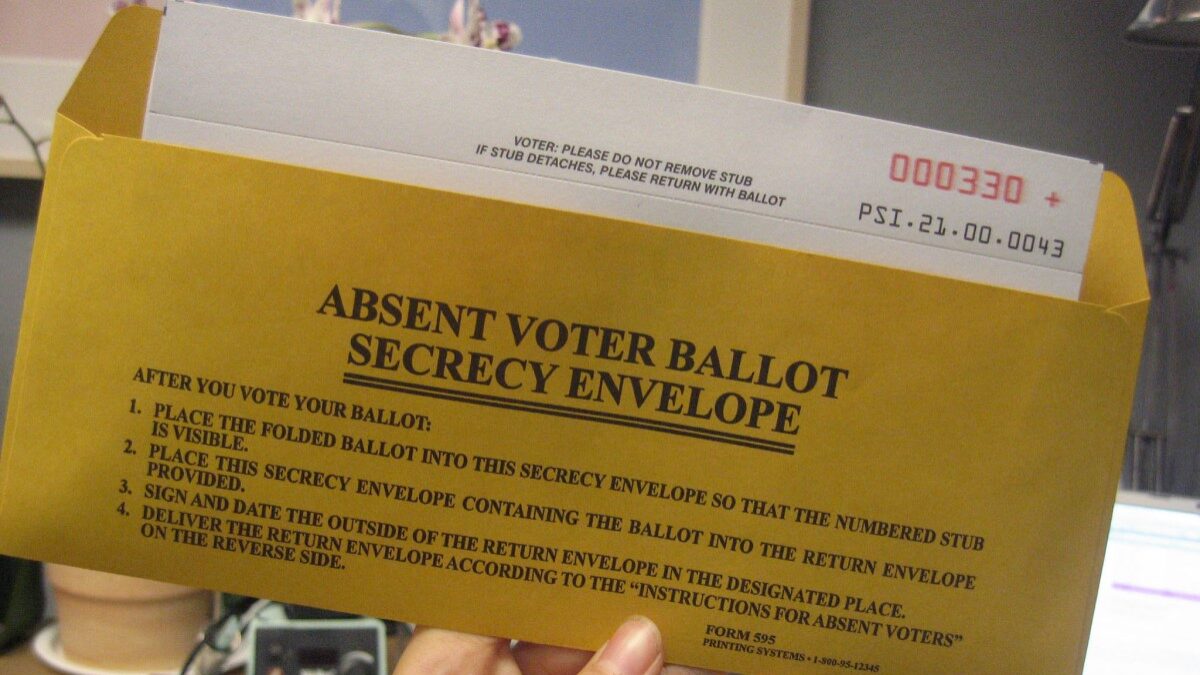A nonprofit connected to Mark Zuckerberg-funded groups worked with Michigan Secretary of State Jocelyn Benson to influence state elections ahead of 2020. The changes include getting the state to alter how it used absentee ballots without an act of the state legislature.
Documents exclusively obtained by The Federalist through an open records request show National Vote at Home Institute CEO Amber McReynolds working with Benson to change Michigan elections policy. NVAHI shares leadership ties with the Center for Tech and Civic Life, a group that shuttled money from Zuckerberg to government election agencies ahead of the 2020 election, as The Federalist previously reported. In several instances, NVAHI and CTCL worked together to influence the 2020 election.
The documents also show that the private organization funded by Facebook tycoon Zuckerberg exists to push states to adopt mass mail-in balloting of the kind that made chaos of the 2020 election.
Mail-in ballots are proven to be significantly more susceptible to fraud, as a bipartisan federal election integrity commission chaired by former President Jimmy Carter concluded in 2005. That’s because mail-in ballots provide more opportunities to influence, obtain, and traffic in ballots.
In one recent example, during a 2017 city council election in Dallas, Texas, investigators found one person had fraudulently signed 700 mail-in ballots—more than the total vote difference between competing candidates at the time. During the 2020 election in Wisconsin, officials took part in ballot trafficking and used drop-boxes for mail-in ballots, which a judge later ruled violated state law.
Private Groups Telling Public Employees What To Do
In Michigan, this highly partisan organization directly affected voting rules, the new documents show. In the emails, McReynolds suggested that Benson use administrative rulemaking to implement a permanent absentee voting option in the state. Administrative rulemaking means making regulations based on an interpretation of the law, often yielding regulations that differ from the law’s original intent and sometimes its explicit text.
“I was thinking that you may have rule-making authority,” McReynolds wrote in an email on Feb. 5, 2019. “The language below indicates that voters have a right to vote without giving a reason, which to me has left open the possibility of permanent or election specific absentee requests. To me, this means you do not likely need a legislative change.”
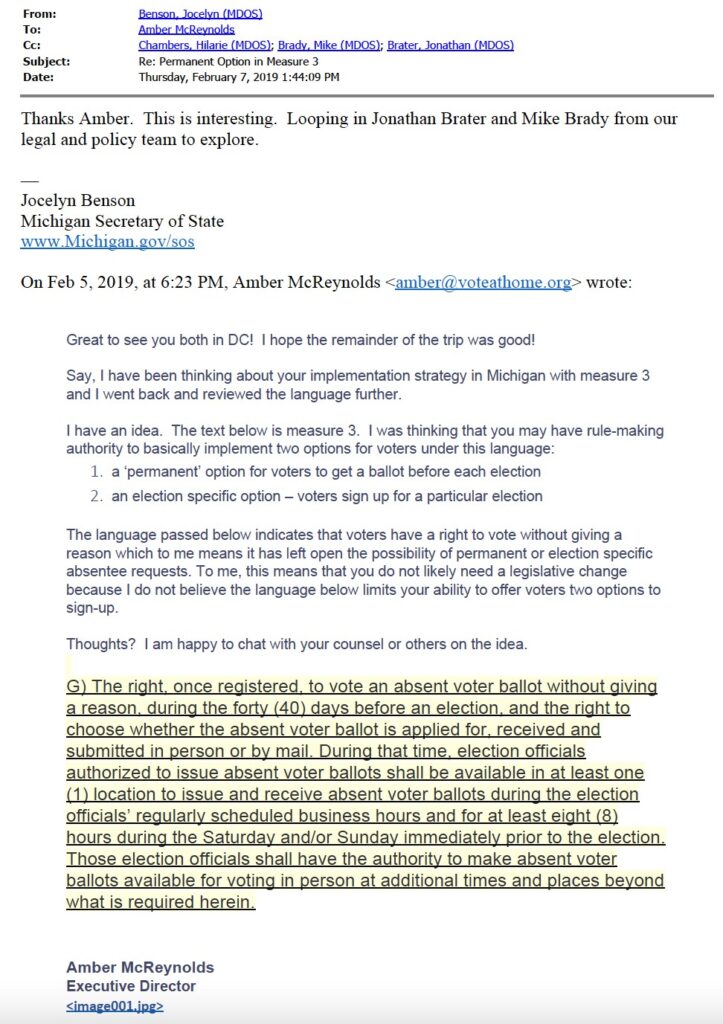
“Thanks Amber,” Benson replied, “Looping in Jonathan Brater and Mike Brady from our legal and policy team to explore.”
Brater served as Benson’s legal policy director in 2019, and Brady began working as her chief legal director in February 2019, according to LinkedIn. Benson named Brater director of elections in November 2019.
Benson spokesman Jake Rollow said Benson’s actions conformed to state law.
“Michigan’s voters enshrined the right to vote absentee in our state constitution in 2018, and upon being sworn in to office Secretary Benson went to work implementing the will of the voters,” Rollow said.
Private, Zuckerberg-Connected Group Affects Election Policy
The National Vote At Home Institute focused its 2020 work in Michigan on its top goal of increasing mass mail-in balloting. By January 2020, NVAHI had “hired a lobbyist to quietly push for an administrative fix that would speed up the ballot processing and counting in Michigan,” according to a 2020 presentation obtained through The Federalist’s open records request. NVAHI detailed a five-step plan to push universal absentee ballots, according to meeting material from 2019.
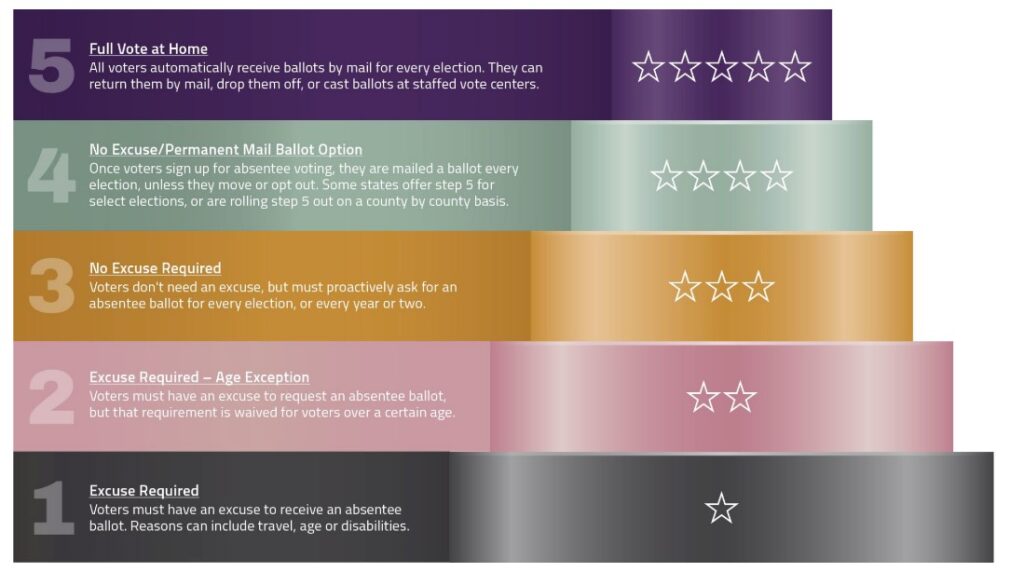
The states that receive one star from NVAHI’s rating system are those that require a valid excuse to vote outside a private booth on election day. States with five stars, its highest rating, had achieved NVAHI’s end goal of “Full Vote at Home.”
NVAHI developed four strategies to push 100 percent mail-in balloting policy in all 50 states, according to 2019 meeting material. The materials say the organization uses the first strategy to eliminate state safeguards on mail-in ballots: “Strategy 1: Reduce the number of Step 1 and Step 2 (excuse required) States to zero. We can achieve this through federal legislation or state by state (legislature or where possible– ballot initiatives),” meeting material reads.
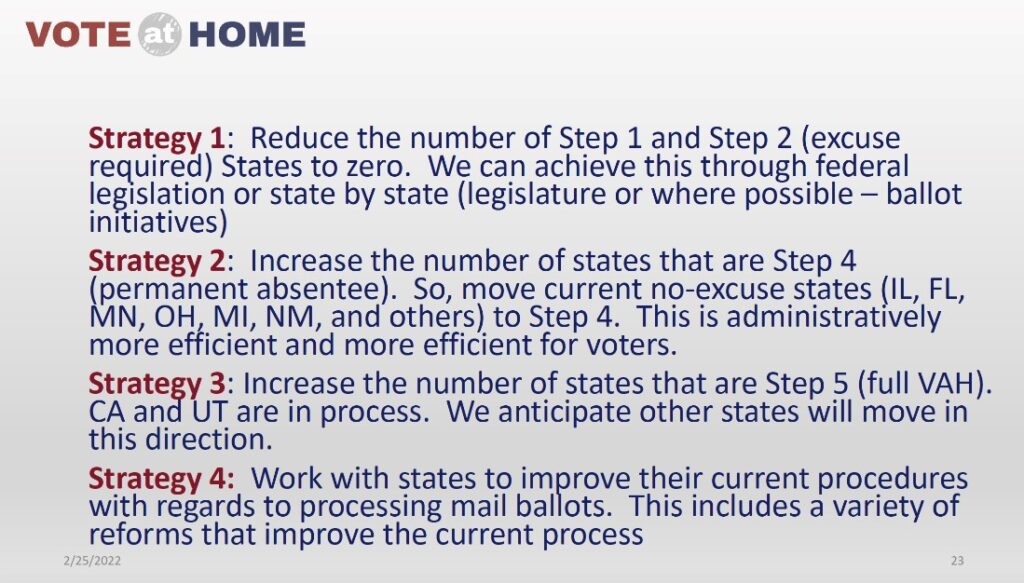
The group’s second strategy is to increase the number of states with a permanent absentee ballot option: “Strategy 2: Increase the number of states that are Step 4 (permanent absentee). So, move current no-excuse states (IL, FL, MN, OH, MI, NM, and others) to Step 4,” the meeting material reads.
NVAHI’s third strategy is to increase the number of mail-in-only states: “Strategy 3: Increase the number of states that are Step 5 (full VAH). CA and UT are in process. We anticipate other states will move in this direction,” say the meeting materials.
The group’s final strategy is to affect how government election offices process absentee ballots: “Strategy 4: Work with states to improve their current procedures with regards to processing mail ballots. This includes a variety of reforms that improve the current process,” meeting material reads.
In 2020, NVAHI’s Circle of Advisors provided an update on the group’s national policy efforts, according to the Federalist-obtained public documents. A map in this update claimed progress in Michigan during 2018/2019 with “no excuse absentee,” but even more was planned for 2020, including “fixes to allow for earlier processing of ballots.”
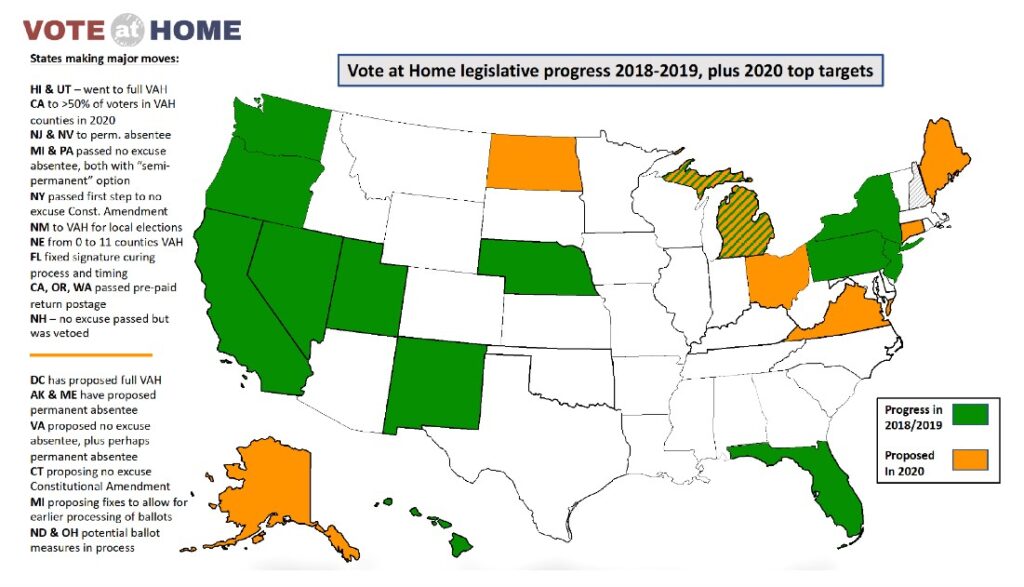
According to the emails obtained by The Federalist’s records request, McReynolds met with Benson about Michigan elections multiple times in 2019.
“I would like to connect with you about some follow-up items from my visit,” McReynolds wrote in an email on Jan. 26, 2019. “Perhaps a quick chat at some point while you are at NASS [National Association of Secretaries of State].”
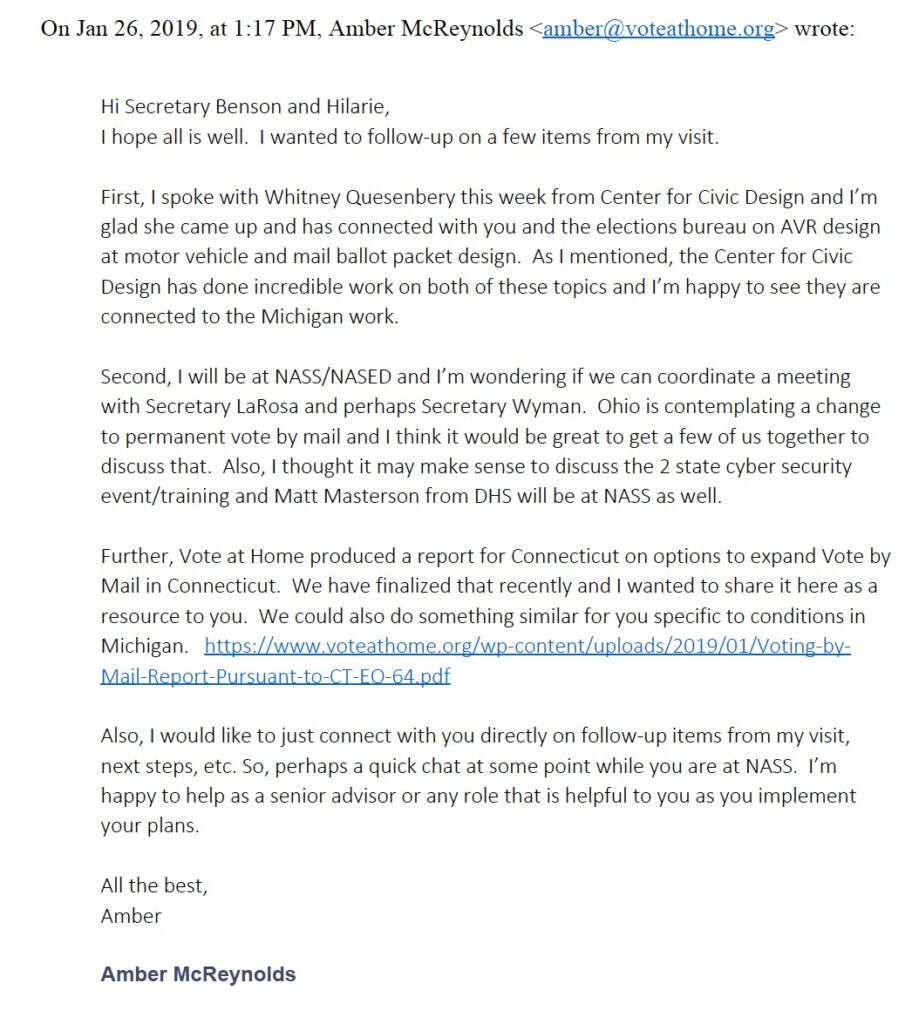
After a previous visit, the emails show, McReynolds planned to meet with Benson and several other secretaries of state at the NASS conference in Washington, D.C.
“I wanted to see if we could connect in DC [sic] during NASS,” McReynolds wrote in a Jan. 28, 2019 email. “I was hoping to spend an hour discussing a few topics.”
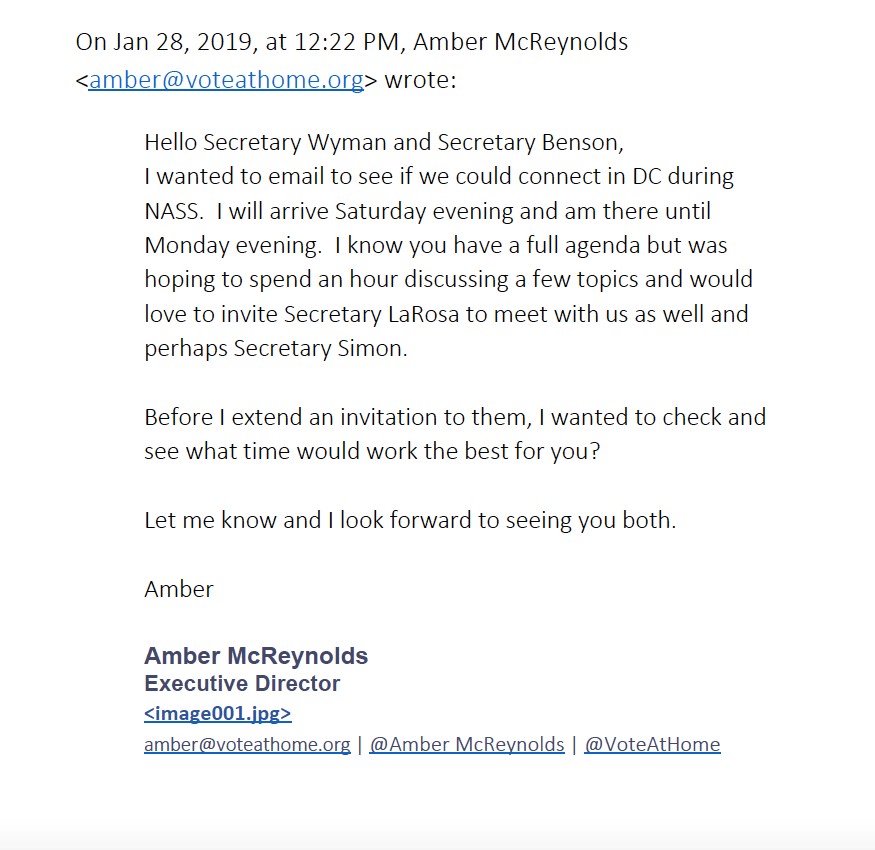
McReynolds also asked to meet with Benson privately in D.C. to discuss Michigan elections, and Benson agreed, the emails show.
“Perhaps you and I can chat about Michigan specifically on our own,” McReynolds said in an email on Jan. 30, 2019. “Sounds good!” Benson replied.
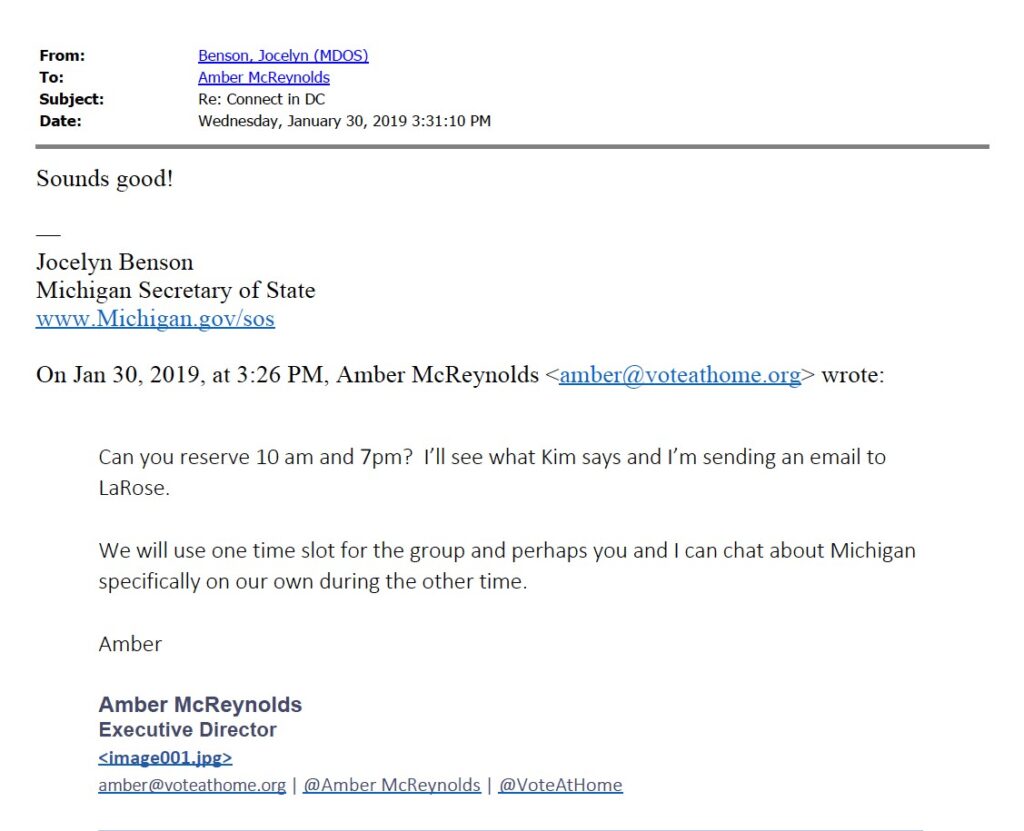
In February 2019, Benson took advice about absentee ballot applications from both McReynolds and Stephen Silberstein. Silberstein is a left-leaning donor connected with Democracy Alliance and National Popular Vote, according to InfluenceWatch.
“This is very helpful,” Benson said. “We will be implementing many of your suggestions.”
Shortly after their January 2019 meeting in D.C., McReynolds offered Benson and former Secretary of State Kim Wyman (R-Wash.) the position of co-chairs of NVAHI’s new Circle of Advisors, the emails show.
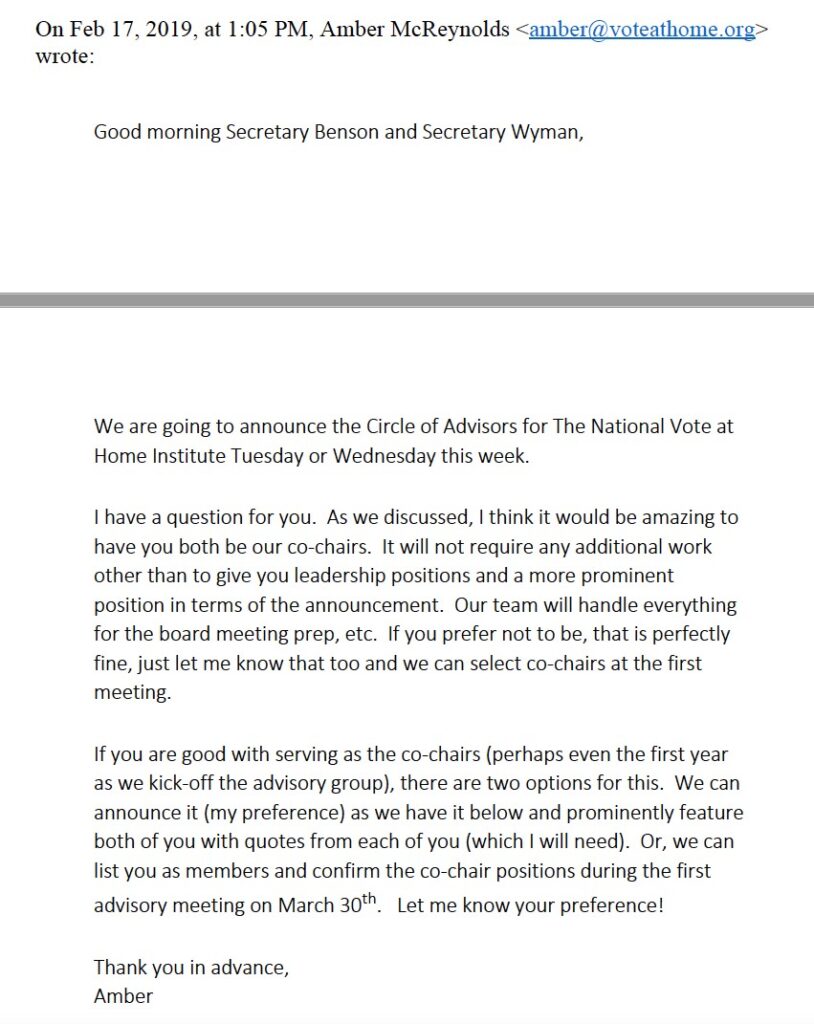
“I am happy to serve,” Benson replied on Feb. 19, 2019. Wyman, however, is not currently listed as a member of the group.
Benson’s Spokesman Denies Private Influence
Rollow claimed McReynolds had “limited and minimal” interactions with McReynolds.
“She was asked to join NVAHI’s circle of advisors, but her direct interactions with McReynolds have been limited and minimal,” Rollow said.
Benson joined Tiana Epps-Johnson, the founder and director of the Zuckerberg-funded Center for Tech and Civic Life, on NVAHI’s Circle of Advisors. In 2020, CTCL funneled approximately half a billion dollars from Zuckerberg to public election agencies in 2020, as The Federalist previously reported.
Partisan Employees Running Public Elections
After officials accepted CTCL grants, NVAHI “grant mentors” sometimes gained access to absentee ballots and edged public officials out of the election process. In Wisconsin, NVAHI’s State Lead Michael-Spitzer Rubenstein—who previously worked for Democrat political campaigns—personally accessed absentee ballots, over Green Bay City Clerk Kris Teske’s objections.
Teske later resigned due to frustration over election intervention by third-party groups like CTCL and NVAHI.
“I don’t know what to do anymore. I am trying to explain the process but it isn’t heard,” Teske said. “I don’t understand how people who don’t have knowledge of the process can tell us how to manage the election.”
The Federalist reached out to McReynolds for comment but did not receive a response.
